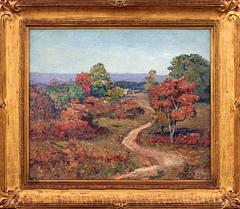Theodore Clement (T.C.) Steele
| male | 1847-1926 |
|
Era:
19th/20th Century |
|
|
Life city:
Gosport, IN |
|
|
Work city:
Nashville, IN |
|
| Teachers: Benczur Loefftz |
|
| Styles: Figures Flowers Landscapes Paintings Portraits Rivers Still Lifes |
|
Drop us a note on your art or call the gallery (317) 253-5910.
Theodore Clement Steele was born in the countryside near Gosport, Indiana on September 11, 1847. When he was a young boy, his family moved to the village of Waveland. Steele attended the Waveland Collegiate Institute, a college preparatory school, in 1859 and began to study art. Steele would regularly lead the drawing classes at the Institute and after his graduation in 1868, began to establish himself as an accomplished portraitist in the area. Steele married Mary Elizabeth "Bessie" Lakin in 1870 and the two moved to Battle Creek, Michigan, where they would live for three years. While there, Steele continued his portrait commissions and worked diligently to refine his technique and understanding of anatomy. After the birth of two children, the couple decided to move back to Indiana so as to be closer to family and friends and, in 1873, they settled in Indianapolis. In 1877, Steele joined several other Indianapolis artists in opening the Indianapolis Art Association, which hosted a wide variety of art classes. The organization closed in November of 1879 after only two years due to financial difficulties. That same month, however, would prove to be pivotal in Steele's artistic development. Led by the local businessman, Herman Lieber, thirteen of Steele's friends pledged $100 each to finance several years of study in Europe for him. The Steele family left for Munich the following year. Steele enrolled in the Royal Academy of Munich and began to study life drawing. The following year, he began studying with the noted painting instructor Ludwig von Loefftz, improving his technique and color sensitivity. After five years of study in Munich, Steele and his family moved back to Indianapolis, leasing a house on Sixteenth Street known as Tinker Place. The flowers and shrubs that surrounded the property were often painted by Steele. He even built a studio on the property so that he could work close to home, surrounded by the inspiring foliage. This site would eventually be sold to the Art Association of Indianapolis and would serve as the location for the John Herron Art Institute. In November of 1894, Steele participated in an exhibition by the Art Association of Indianapolis. He was joined by William Forsyth, Otto Stark, Richard Gruelle, and J. Ottis Adams. The exhibit was entitled Five Hoosier Painters, and it gained regional prominence after traveling to Chicago. The work was praised by Chicago art critics, who began to refer to the painters as the Hoosier Group. Steele, with the help of Adams and Forsyth, took advantage of this new-found recognition and formed the Society of Western Artists in 1896, a group dedicated to supporting and exhibiting regional artists and their work. Steele suffered a major loss in the fall of 1899 when his wife, Libbie, died after a long bout with rheumatoid arthritis and tuberculosis. Libbie had been his staunchest supporter and closest friend, and her death devastated Steele. Feeling at loose ends, Steele would spend the next several years alternating between Indianapolis and Brown County, Indiana in addition to taking two ambitious painting trips to the West Coast. Steele eventually purchased a large tract of land in Brown County in 1907, and began building a home and studio there. Later that same year, he married Selma Neubacher, the sister of Steele's son-in-law. The two left Indianapolis for Brown County and moved into their new home, known as the House of the Singing Winds. The surrounding countryside invigorated Steele and he would spend as much of his time as possible out-of-doors painting. In 1922, Steele took a position as honorary professor of art at Indiana University, in nearby Bloomington. Steele and Selma began spending their winters in the college town, hosting students and faculty for impromptu visits and discussions. In the early summer of 1926, Steele became gravely ill, and traveled to Indianapolis and Terre Haute to undergo treatment and observation. He returned to his home in early July. His health continued to worsen, and Steele died on July 24th, 1926. We are very interested in purchasing artwork by T.C. Steele. Please contact us if you have pieces you are considering selling. The following information was submitted by a site visitor: Theodore Clement Steele (1847-1926) was an American Impressionist painter known for his Indiana landscapes. Steele was born in Owen County, Indiana and later moved to Indianapolis. He studied at the Royal Academy in Munich, Germany from 1880 to 1885, when he returned to make his living primarily from painting portraits. His passion for landscape painting, however, inspired travel throughout southern Indiana and the purchase in 1898 of a studio-home in Brookville with fellow artist J. Ottis Adams. After the death of his first wife, Mary Elizabeth Lakin, in 1899 and the marriages of his three children, Steele moved to Brown County with his second wife, Selma Neubacher. There he concentrated on painting the hills and hollows of the rural country and his presence helped to attract a group of artists who became known as the Brown County Art Colony. For the Purpose of studying Steele's work, the museum categorizes his paintings into three main time periods, including the Munich period (1880-1885); Brookville period (1898-1906) and Brown County period (1907-1926). During the time between Munich and Brookville, Steele painted near Indianapolis or on sojourns to Vernon.
Can you tell us more about the life or art of Theodore Clement (T.C.) Steele? Please contact us if you can add to our biography.








































